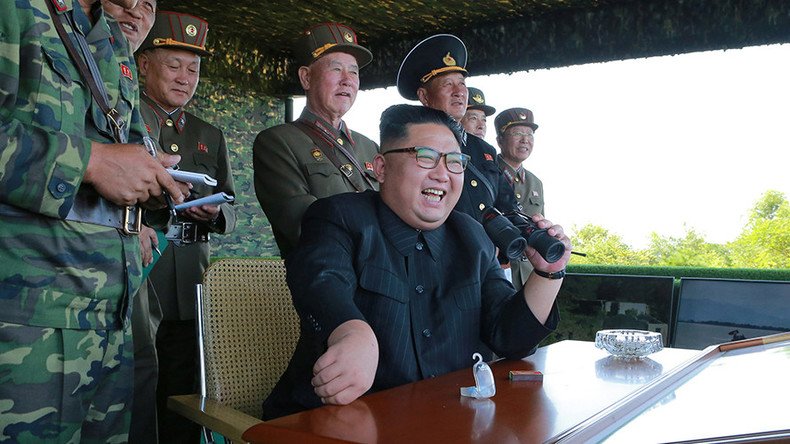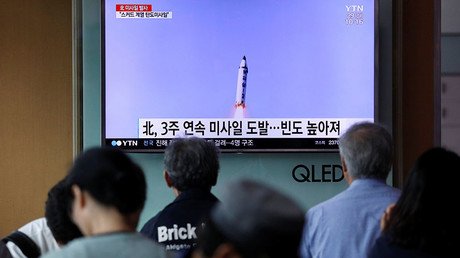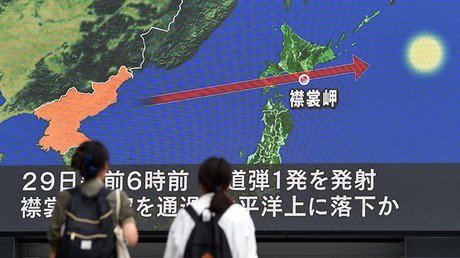UN sanctions no longer working on N. Korea, unilateral action worsens crisis – Russian officials

The UN Security Council has exhausted its ability to affect North Korea with sanctions, the latest missile test indicating that restrictive measures are failing, Russian deputy foreign minister and Head of Parliament's Foreign Affairs Committee have said.
“It is obvious that the sanctions pressure resource is exhausted,” Russia’s foreign ministry deputy head Sergey Ryabkov said following North Korean missiles’ fly-by over Japan on Tuesday morning.
“It is no longer possible to pass resolutions in the UNSC which do not contain a clear indication that there cannot be a military solution to the problem, only a political one,” Ryabkov said. The diplomat added that the UN must also exclude additional unilateral sanctions, while “new steps towards toughening of sanctions regime can be expected” from the US and its allies after the recent launches.
Tensions remain high on the Korean Peninsula while the US and South Korea are involved in massive war games in the region, which could have “played its part” in provoking Pyongyang into the new missile test, the deputy mister believes.
Meanwhile, North Korea justified the tests, saying it has the right to respond to “hostile intention” against Pyongyang.
“Now that the U.S. has openly declared its hostile intention towards the Democratic People's Republic of Korea, by waging aggressive joint military exercises despite repeated warnings... my country has every reason to respond with tough counter-measures as an exercise of its right to self-defense," Han Tae Song, North Korea's ambassador said at the UN Conference on Disarmament in Geneva as cited by Reuters. The envoy added that Washington will be “wholly responsible for the catastrophic consequences it will entail.”
Pyongyang’s threats to strike Guam ‘are not a bluff’
Tuesday’s launch has led to stalemate in the North Korean crisis while the UN sanctions aimed to pressure North Korea over its nuclear program and missile tests have failed to succeed, Konstantin Kosachev, the head of the Foreign Affairs Committee in the Russian Federation Council said.
“This provocative launch proves a stalemate has formed around the North Korean problem: the UNSC resolution passed in the beginning of the month has failed to achieve its goal, as the situation has moved into bilateral mode between the DPRK [North Korea] and the US,” the lawmaker wrote on his Facebook page.
At the same time North Korea's latest launch shows its threat to fire missiles to the US Pacific territory of Guam was not a bluff, Kosachev warned.
"Alas, Pyongyang has demonstrated that its threats to the US base on Guam are not a bluff," he stated, adding that while it is not proven that North Korea has intercontinental missiles, it is definitely developing the technology that in theory would jeopardize the US West Coast.
The lawmaker also said that both North Korea and the US should carefully consider their actions to let the world “wake up more peacefully every morning.”
“Ultimately if [we] continue to demand observance of international law, predictability and transparency only from Pyongyang, while the US reserves the right to take any action, up to forceful intervention and regime change in the DPRK, the vicious circle will only gain momentum,” Kosachev said.
Meanwhile the real actions of the rival parties in the region are restrained and the tensions are not as high as they used to be, the Russian lawmaker noted, adding that it is “partly encouraging, but, of course, does not solve the problem. And a solution must be found, which Pyongyang has once again clearly and categorically confirmed.”
READ MORE: Trump says 'all options are on the table for North Korea' – White House statement
Kosachev believes that the most reasonable decision would by the implementation of the “double freeze” initiative, designed and supported by China and Russia. The plan involves simultaneously stopping missile tests by North Korea and halting South Korean drills with the US.
“In this vein, I believe, it is necessary to hold discussions within the UN Security Council, which is convened at the request of Japan,” he said.














